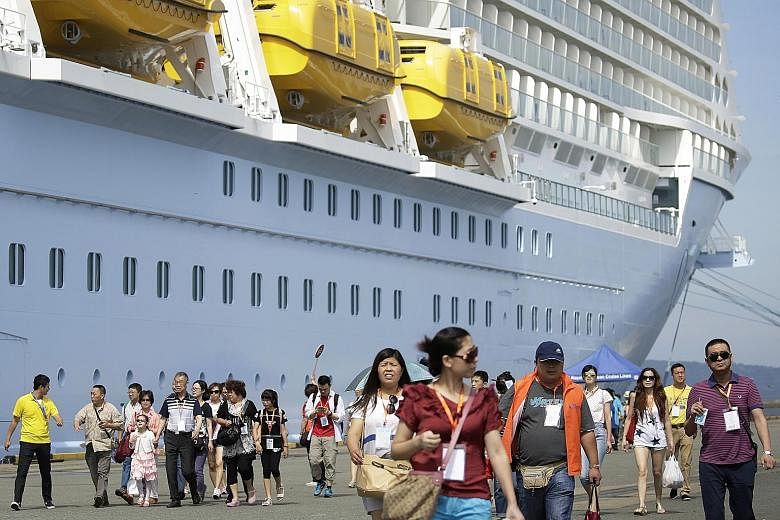SHANGHAI • While shuffling his family aboard the 16-deck Quantum of the Seas cruise ship bound for Japan, Mr Yu Zhihong admitted that he has often told his children that Japan is no good.
That did not stop the 45-year-old Chinese salesman from booking a trip across the East China Sea to his country's long-time rival.
"Japanese people are nice and have some good qualities," Mr Yu said. "I'm only upset with the Japanese government because we need to respect the history between us."
Four million of Mr Yu's countrymen - a two-thirds increase from last year - are expected to head to Japan this year to eat sushi and snap up rice cookers and electronic toilet seats. More than 40 per cent were from the greater Shanghai area last year, said the local Japanese consulate, while Beijing accounted for about a quarter of visas granted.
The surge in Chinese holidaymakers is due to a weaker yen cutting travel costs and an outbreak in South Korea of the Middle East respiratory syndrome.
Less clear is why so many of the tourists are from Shanghai. Mr Su Zhiliang, a Shanghai Normal University history professor who focuses on Japan, attributes the trend to the commercial hub's pragmatic and cosmopolitan nature, saying: "It was the earliest and probably most important locale for the intersection of Japan's power, culture and settlement in China... The trend has weathered all political tensions."
Among the most visible signs of the local enthusiasm for Japanese holidays are the ocean liners streaming from Shanghai Wusongkou International Cruise Terminal. Ships like the Quantum of the Seas and the SkySea Golden Era will make about 250 Shanghai-Japan trips this year, more than double last year's 110, the consulate said.
Japan saw 2.7 million Chinese arrivals last year, rising 47 per cent from a year earlier.
Tourism is booming even as the upcoming 70th anniversary of Japan's World War II defeat rekindles old animosity. China, which lost more than 20 million people in the conflict, has expressed concern over Japanese Prime Minister Shinzo Abe's suggestions that he will not repeat the apologies of his predecessors when marking the event.
The influx of Chinese shows that there is hope for better rapport between the two countries, said Mr Liu Jiangyong, a Tsinghua University professor who specialises in Sino-Japanese relations, adding: "Frequent people-to-people exchanges can de-demonise China and Japan in each other's eyes."
The number of Japanese tourists to China continues to fall, however, according to the Japan National Tourism Organisation. About 2.7 million visited last year, down 26 per cent from 2011.
Ms Wang Hua, 33, said diplomatic tensions with Japan did not factor in her decision to take her son aboard the SkySea Golden Era. She said she wanted to experience Japan, adding: "Politics is something for the government to worry about." She said: "There's a lot in Japan we can borrow and learn from. So, I'm going this time to check out its people and culture."
BLOOMBERG

